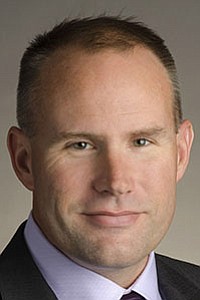Stephen Seal found his first business success in buying and selling rural land. Now, the investment manager, who lives in Long Beach and operates his companies out of Vancouver, is moving in a big way into investments in tax liens on foreclosed properties, mostly undeveloped land, in Florida and Arizona.
Seal cut his investor teeth with LandCentral, a broker of small rural properties that he launched in 1997 and relocated from Portland just over three years ago. The business has sold more than 35,000 acres of land across the U.S., including middle-of-nowhere properties that appeal to hunters and other outdoor types.
While continuing to operate that business, Seal is raising his profile by securing accredited investors in his latest venture, called Voyager Pacific Capital Management. The two companies have a combined 12 employees.
The new company’s investment fund, called Voyager I, is providing capital for purchases of tax liens on properties with unpaid tax liabilities. Such liens are allowed in 29 states, a list that does not include Washington or Oregon. Voyager Pacific is investing in those liens, primarily in Florida and Arizona, which can produce handsome returns in situations. Owners of properties with liens against them are given an opportunity to buy the liens from the investors with a stiff interest payment. But the real profit comes when the property owners don’t purchase the liens from the investors, and the lien investors acquire the property for the price of the unpaid taxes.
Seal launched the fund last summer to raise $2 million for the venture. He then asked the Keiretsu Forum, a worldwide network of “angel” investors in business startups, to conduct a due diligence review of the fund. Such a review provides an independent analysis of the fund’s risk and potential profitability to Keiretsu Forum members and other accredited investors who are eligible to invest in high-risk funds.
The review produced a 75-page report, which concluded that the fund is well structured and that the company’s management team “has the requisite skills to execute the (investment) strategy.”
Ken Olson, a Puget Sound-area Keiretsu Forum member and investor who was involved in the review, said Seal’s experience in land investment was a big plus for the new fund.
“I think the thing that was quite impressive was that, while launching the fund is a new thing for him, he’s been in this space for a long time. He’s been looking at small real estate for so many years,” Olson said.
Seal says investors can expect a return of 15 to 16 percent, although the return can vary greatly depending on the availability of property and competition at the county tax lien auctions. Only about 5 percent of Voyager Pacific’s lien purchases are likely to lead to ownership of the property to which the lien is attached, the company says.
The Voyager I fund is nearly fully funded at its $2 million limit, Seal said, adding that he expects to soon launch another fund. The Keiretsu due diligence report gives him access to that organization’s large pool of investors.
Olson, of the Keiretsu Forum, said the organization’s reviewers had some concerns about endorsing an investment fund that could have the effect of forcing people out of their homes. He said investors were reassured that only a small percentage of the liens were on homes. The company says most of the liens are on undeveloped land.
Seal told The Columbian that Florida prevents the government sale of tax liens on a person’s primary residence, although the liens can be sold on second homes or rental property. In Arizona, where such a law is not in place, he still can accept the idea of acquiring a home due to unpaid taxes. ryone has an obligation to pay, ” he said.




